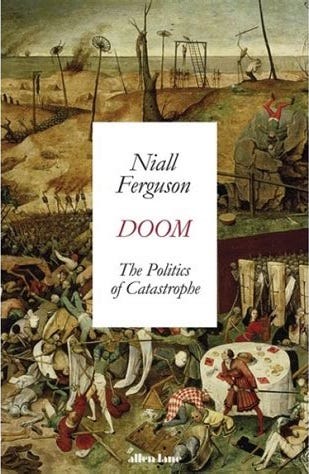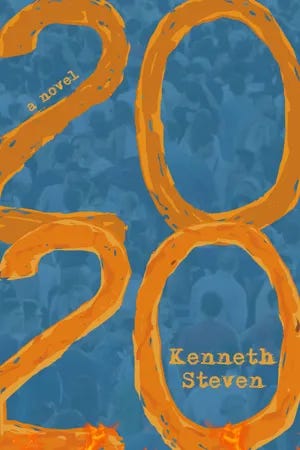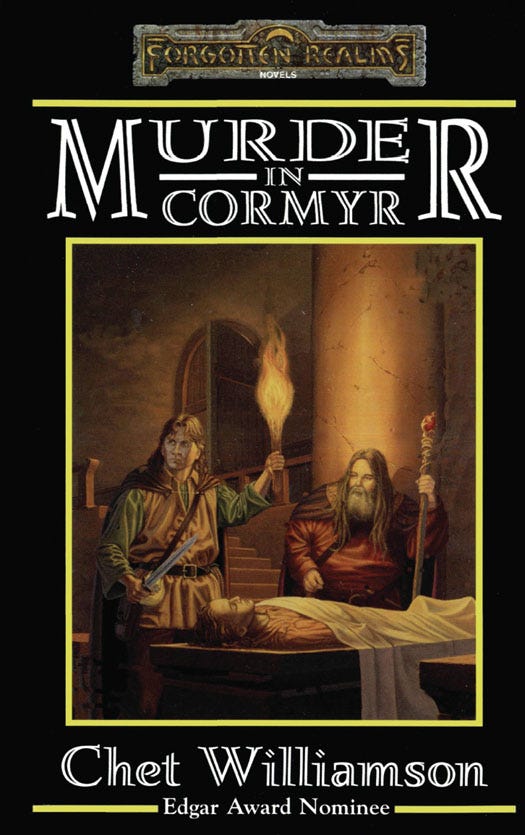I write about books and stories I have read throughout March 2025, spending more time on ones I didn’t like compared to those I did like.
Books Read - 8/52
On Paper
Pallas by
Kylan becomes stranded on the asteroid Pallas, believed to be uninhabited and cut off long ago from the Ceres Mining Company, but one green eyed blonde betrays Pallas’s secret and he is welcomed into the hidden colony to be treated like a hero. Soon everything takes a turn for the worst and Kylan Bence is forced to face the secrets of Pallas, mushrooms and all.
Excellent book. You can read
here on SubStack at . Her books are available on Amazon (print and digital). I went for print as the cover is delightful.Doom: A Politics of Catastrophe by Niall Ferguson
Niall Ferguson attempts to dispel the Great Man Theory of history and any notion of cyclical history in one fell swoop. His aim is primarily at the new field of cliodynamics which treats history as a science where events can be modelled and predicted. Ferguson’s efforts illustrate why history is not a science and that cliodynamics is either wrong or far off being useful but he does not succeed in dispelling the Great Man theory or cyclical history more generally.
While it is clear from his examples of Chernobyl and Challenger, alongside a number of others, that the General Secretary of the Soviet Union or President of the USA may not be responsible for a disaster there are great men in each event who have the bulk of power and responsibility, the final say as it were, while there is also a failure of middle management to either listen or report, and sometimes both. In the case of Chernobyl there were system faults with the type of plant at Chernobyl due to failure at another plant in Lithuania which were known to the Soviet nuclear authorities but had not been shared. As a result when the man in charge was running a test and something failed he didn’t have the knowledge available to mitigate or prevent it escalating. In the case of Challenger the engineers knew the fault of the O-rings and the recommendation was to ‘not launch’, managers at NASA and Morton Thiokol (the contractor who made the rocket boosters) wanted to go ahead, for various reasons from quotas to contracts, and eventually the vice president, Joe Kilminster, of Morton Thiokol signed off on the launch because the president of Morton Thiokol wanted to maintain good relations with NASA and secure the next contract for solid rocket boosters. In the end the managers ignored the engineers because the two groups did not share the same goals, namely safe space shuttle launches, and the decision, the power, was in the hands of small group of men, perhaps 4 at most. While these men were not the Great Men of their day, they were great men in their fields and during those events.
Another example would be the Los Rodeos Airport disaster where two planes collided on the runway due to a mix of congestion (Gran Canaria airport was closed due to a potential bombing), weather (the fog was thick, reducing visibility), and poor communication (the American and Dutch planes didn’t hear each other and the Air-Traffic Control (ATC) was listening to a football game while working). Not only that but the paint had faded on the runway so it wasn’t clear which taxiway was which and the lights in the centre of it had failed. However, at the end it was the decision of the Dutch pilot to begin take off without ATC approval that resulted in the collision which killed 583 people. Why he did so has a myriad of rather unconvincing reasons, from stress, to behaving in habitual flight training ways, to recent legislation regulating how many hours Dutch pilots could fly in a month and him not wanting to be stuck in Tenerife. The fact is he made a decision that no one else could, to begin take off without ATC clearance. His passengers had no power, his co-pilot had already challenged him on the decision and was ignored, the American plane couldn’t see until it was too late, and Air-Traffic Control was not equipped with ground radar to adequately see what was going on. While there were many, many nodes of failure leading up to the disaster, it can be placed on one pilot’s error of judgement in the moment, the great man in the event as it where. Not everyone is Napoleon but there is a Napoleon in every event.
His attempt at dispelling any notion of cyclical history also stumbles, at least in my estimation and undestanding of the idea, in that he attempts to paint it as a only a predictive tool of events when really cyclical history is predictive of human behaviour and recognising that institutions, nations, governments, are just as organic as the people who compose them. His own examples prove the point. During the Spanish Flu, just like with Covid, there were pro-maskers and anti-maskers. The arguments were on similar lines too, safety and spread versus civil liberties and efficacy.
While it is clear to me that not every historical event is orchestrated nor cyclical and many disasters are cumulations of failure, a point he illustrates very well throughout the book, at no point does he finish off the two theories of history he is aguing against. Each time he mentions a specific person who had the weight of power and responsibility or where he compares a past event to a recent one has the effect of reinforcing the very theories he is attacking.
Another factor that comes up time and time again throughout the book is failure of bureaucracy, managers, and middle men, and the schlerotic nature of governments and large corporations which results in lots of policy and “preparedness” but when the event happens, like with Covid-19, all that amounts for naught because very rarely in all the plans is there someone chosen to lead the response and so there ends up being many, which is exactly what happened in America and Britain during Covid. It appears all these procedures and paperwork creates good followers but terrible leaders and in fact what would have helped is a Great Man to take charge.
One other success of the book is illustrating how the media and journalists are wrong in basically every disaster in their rush to simplify and push a narrative, whether blaming the wrong people/person or missing/ignoring vital information, failing to fact check, or simply not waiting long enough to publish. Ferguson also takes aim at governments who either try and cover up disasters, omit vital details to the public, respond too slowly or not at all, and rarely have the health of the citizens as their primary goal. Concerns over quotas and targets, cost, reputation, contracts and money, or the personal success of politicians and bureaucrats all come before the people these institutions are meant to working for.
2020 by Kenneth Steven
*SPOILERS*
Written in 2015 this book tells the story of Britain at breaking point, with political violence exploding, literally, in a few places around the country and then he just wraps it up with a soppy speach that makes everyone feel empathetic again. It reads naive but it is the hope and expectation of the soppy middle class southern Britons. He even captures this element near the end, the North-South divide, but it amounts to nothing. The root of the civil conflict is a terrorist attack on a train that leads to anti-immigration groups taking action, initially as marches and electing an indepedent MP but that leads to his office being firebombed by a Pakistani group and then him being kidnapped, tried in a Sharia court, and murdered. There’s a protest by the anti-immigration group that turns violent. The government is less than useless in the whole affair and the shining point of the book is highlighting the fact that government and media don’t have a clue, nor do the police in the book. Everyone is left looking worse than they started, to the author’s credit he captures each viewpoint with care and accuracy and no-one comes across as a caricature.
The disappointment of the book is probably its realism if such events were to take place, which they have but not in the connected sequence that Kenneth Steven orchestrates. Britain has had terrorist attacks on public transport (2006 bombings), MPs have been murdered, Jo Cox (Labour) in 2016 and Sir David Amess (Conservative) in 2021, and Prime Ministers have resigned but not nearly for anything as horrific as in the book, and even in the book it is suggested he resigns because his affair was uncovered and not for the terrorism and political violence. 2020 turns everything up a notch, but only one notch, and so it all comes across as possible but because it is fiction it falls flat.
The writing itself is fine, there is an over reliance on words and phrases like ‘something kind of like’, ‘simply’, ‘just’, and ‘actually’ and all in combination that make the different viewpoints all read similarly. It is written as interviews and news bulletins after the events, a style I enjoy, and so everything is told, and it works. It’s short, 154 pages, and the majority are spent building up to the MP’s murder by illustrating what is broken in Britain and why multi-culturalism doesn’t work then in the last third or less Kenneth Steven tries to knit it back together and have empathy and unity win out but it doesn’t work and feels forced. The reality is if the events were to occur things would, as they did mid-last year with the Southport murders, crescendo and then settle again but that does not mean the crisis is over it just mean it is resting, readying for the next ignition.
Murder in Cormyr by Chet Williamson
A rather short murder mystery with conspiracy tangled in told from the perspective of the character gathering the evidence but not figuring out whodunit. Fun read where you can play along and try to figure out who the murderer is as our dear narrator, Jasper, does too.
If published today it might find itself in “cosy fantasy” as it is mostly taverns, ale, conversation, and a little bit of sleuthing by a part halfling who is a bit of coward and sometimes comical. Not a book to rush out and buy but if you find a cheap copy second-hand or at your local library it is worth a quick read.
On Substack
Oh, what to do about the meteor?
A marvellous short story from
, comedic and sorrowful and serious all at once.A rich fantasy tale of wandering tribes, prophets, and warring kingdoms. A fine addition to the Chronicles of Cyron from
.See you later this month for April’s review.
Thanks for reading.











